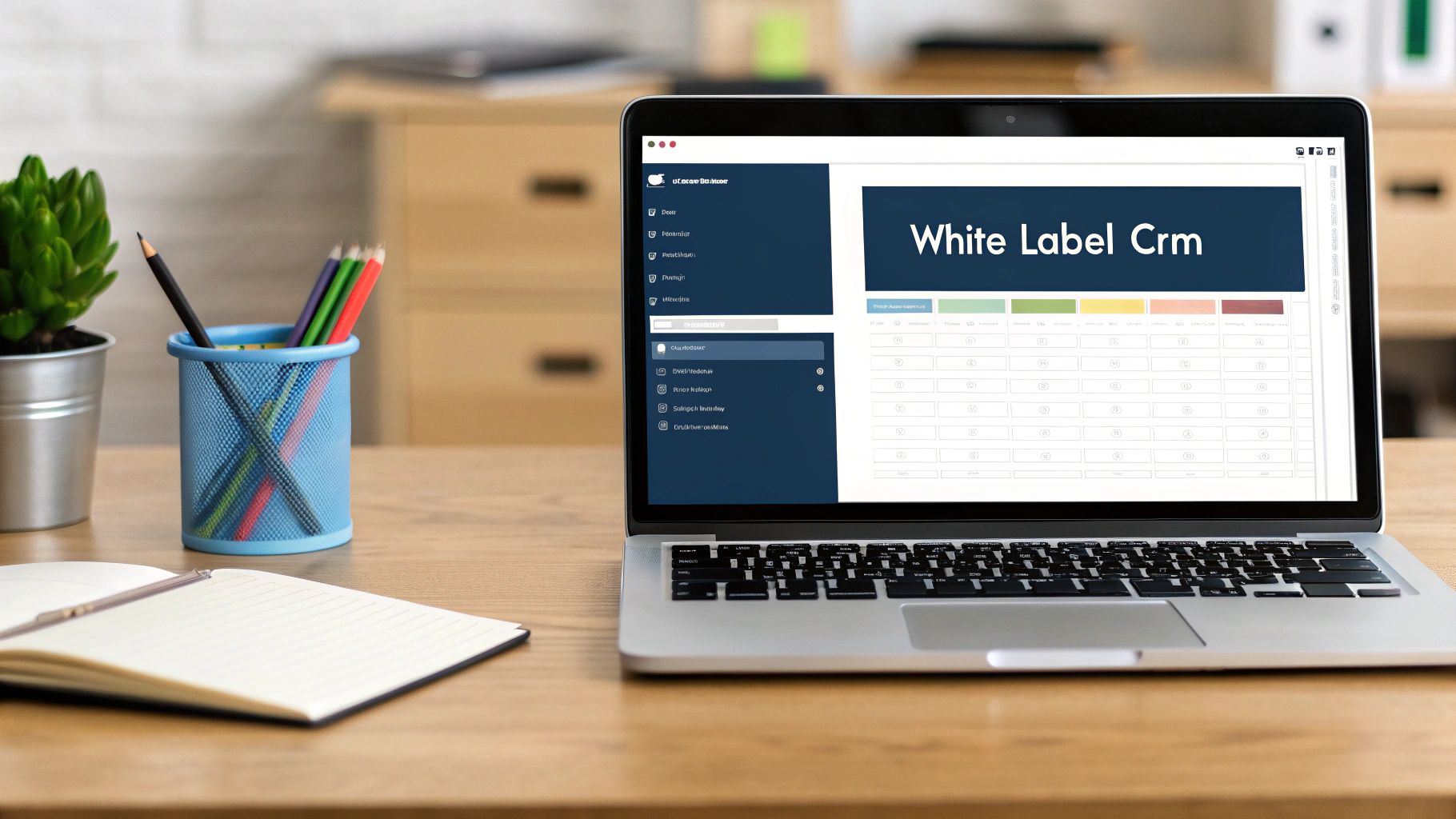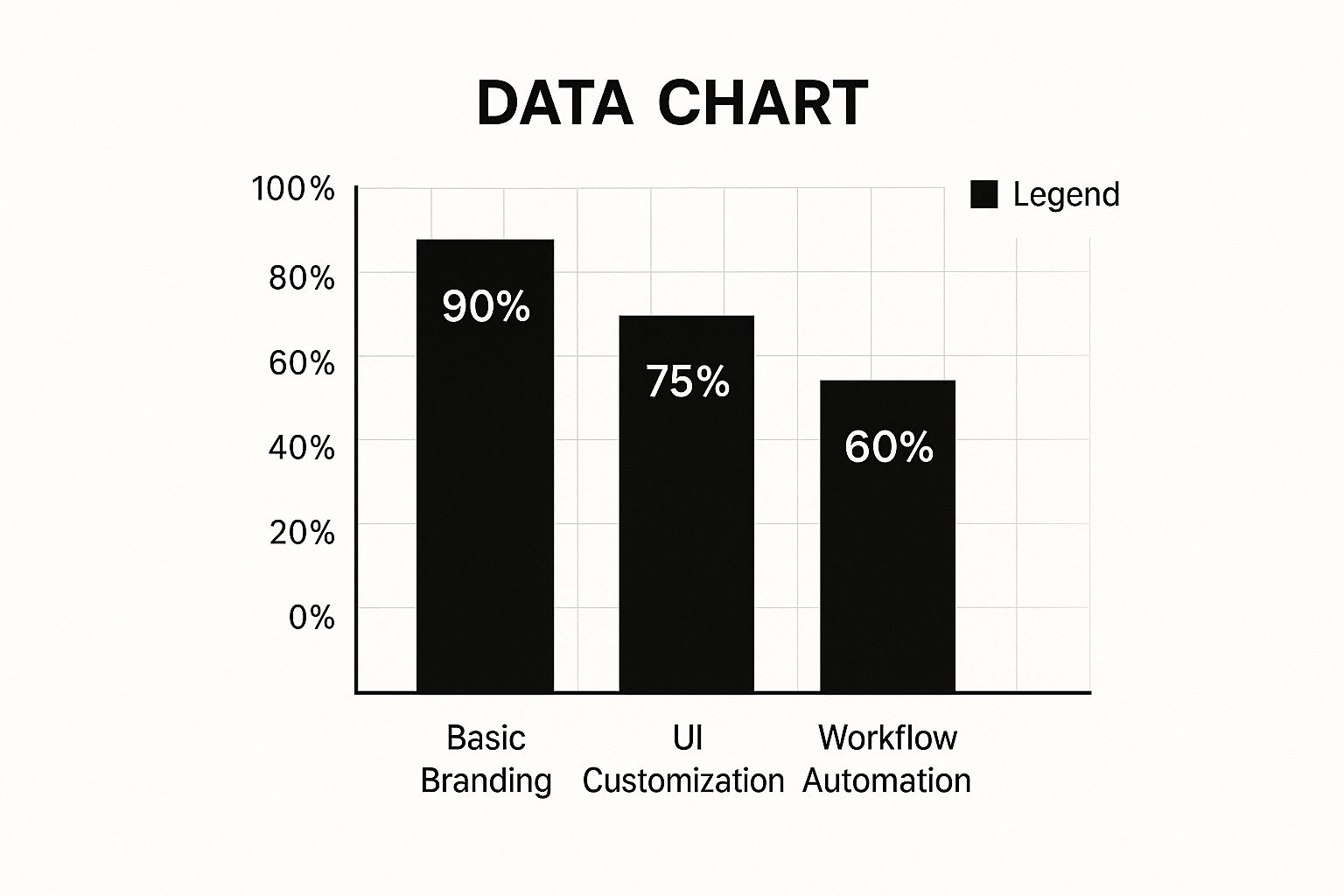So, what exactly is a white label CRM system? Think of it as a pre-built customer relationship management platform, developed by one company, that other businesses can license, slap their own logo and branding on, and sell to clients as their very own product. It’s a game-changer for agencies that want to offer a high-demand tech solution without the crushing expense and time suck of building software from scratch.

Let’s try a simple analogy. Imagine you want to start your own signature coffee brand. Instead of buying a farm and growing the beans yourself, you find a top-tier grower who provides high-quality, unroasted beans. You then take those beans, roast them to perfection, package them in your own beautifully designed bags, and sell them as your unique blend.
That's the core idea behind a white label CRM system.
You're getting a powerful, ready-to-go customer relationship management platform from a third-party expert. You license it, rebrand it as your own, and start offering it directly to your clients. This model is a massive win for businesses, especially marketing agencies, looking to expand their services without the usual headaches.
To really get it, let's break the system down into its two distinct parts.
First, you have the underlying software—the engine. This is all the complex code, the server infrastructure, and the full feature set that the original provider builds, maintains, and updates. They handle all the technical heavy lifting, from security patches to making sure everything runs smoothly.
The second part is the custom branding layer. This is where you get to make it yours. You can upload your company's logo, tweak the color scheme to match your brand guide, and even host the whole platform on your own domain. As far as your clients are concerned, it looks and feels like a piece of software your team built entirely in-house.
A white label CRM is really a strategic partnership. The provider builds and maintains a fantastic tool, while you get to focus on branding, marketing, and delivering that tool to your clients. It’s a straightforward path to creating a new revenue stream under your own name.
Let’s be honest: building a CRM from the ground up is a monumental task. It requires a huge capital investment, a team of highly skilled developers, and constant, ongoing maintenance. For most agencies, that’s just not in the cards.
A white label solution gives you a shortcut to the finish line.
This approach lets you:
By adopting a white label CRM, you’re not just adding another service. You’re adding a valuable, sticky solution that deepens your client relationships and positions your brand as the all-in-one provider they can't live without.
Jumping into a white-label CRM is way more than just adding another tool to your tech stack. It's a strategic pivot that directly pumps up your bottom line. The sharpest agencies are already using this model to build out powerful new revenue streams, cement their authority in the market, and seriously clean up their internal processes.
At its core, it's about making your service offering completely indispensable to your clients.
This move immediately unlocks the door to predictable, recurring revenue. Instead of being stuck in the project-to-project grind, you can bundle a fully branded CRM with the services you already provide. This creates an incredibly 'sticky' offer that weaves your agency into a client's daily workflow, drastically boosting their lifetime value and slashing churn rates.
Think about it: offering a sophisticated piece of software under your own name instantly elevates how clients see you. You're no longer just a service provider; you're a technology partner. This single shift positions your agency as the complete, one-stop shop for everything your clients need, building massive trust and authority in your niche.
The global CRM software market is absolutely exploding, valued at $101.4 billion in 2024 and on track to smash $262 billion by 2032. This isn't just random growth; it's fueled by a universal, desperate need for better customer experiences and smoother operations. By offering a white-label CRM, you get to tap directly into this huge demand without sinking a fortune into software development.
A branded CRM isn't just a tool for your clients. It becomes a powerful operational asset for your own agency, centralizing client management and communication while giving your team invaluable data insights.
Making the CRM feel like a true part of your brand is all about customization. The infographic below breaks down what features agencies are clamoring for most.

As you can see, basic branding is table stakes. But the real value comes from deeper tweaks, like adjusting the user interface and building custom workflow automations that solve your clients' specific problems.
Let's put this into a real-world context. Imagine a digital marketing agency that specializes in SEO and content. By rolling out a white-label CRM, they can craft a premium package that includes:
This integrated solution doesn't just add value; it makes the agency's services irreplaceable. It's a game-changing advantage that turns client relationships into long-term partnerships. To see how this same logic applies to AI tools, check out our guide on building your brand with a white label AI startup. This simple addition transforms a standard service into an all-in-one growth platform for the client.

Let's be honest: not all white-label platforms are created equal. When you're choosing a white label crm system, you need to look past the basics like contact management. The goal is to find a real partner that can help you scale, and that means finding a solution built from the ground up for the reseller model.
Think of it like choosing the foundation for a new house. You wouldn't just pick any old plot of land. You'd need a solid, secure, and flexible base you can build on with confidence. The right features will make your branded CRM powerful for your clients and a breeze for your agency to manage.
This is the absolute baseline. The whole point is to make the platform completely yours. This goes way beyond just slapping your logo on it. True white-labeling means your clients will never even suspect a third party is in the picture, creating a completely seamless brand experience.
Here are the non-negotiables you should be looking for:
crm.youragency.com). This is crucial for reinforcing your brand's ownership.This one is a critical, behind-the-scenes feature called multi-tenancy. Essentially, it's an architectural design that keeps each of your clients' data completely separate and secure from every other client. Think of it like a bank vault with individual, locked safety deposit boxes for each customer.
Multi-tenancy is your guarantee of data privacy and security. It prevents any possibility of data bleeding over between client accounts, which is an absolute must-have for building trust and staying compliant. Without it, you're taking on a massive risk for both your business and your clients.
Granular user permissions are just as important. You need the ability to control exactly what each client's users can see and do, making sure sensitive info stays protected within their own organization.
A CRM really starts to shine when it can talk to the other tools a business uses every single day. A robust Application Programming Interface (API) is the bridge that makes this happen, allowing your branded CRM to become the central nervous system of your client's operations.
Getting data to flow smoothly is everything. Understanding how your white-label CRM can connect to other business software is a game-changer. You can get a better handle on this by exploring the best practices for CRM-ERP integration. This connectivity turns your offering from a simple contact list into a tool they can't live without.
The industry is moving fast, with AI reshaping how we manage customer relationships. By 2025, it's predicted that around 70% of CRM systems will have AI features baked in for things like predictive analytics and automation. To see how this is already being applied, you can learn more about an AI CRM system that eliminates manual data entry forever and get a feel for the bigger picture.
Moving from the drawing board to the real world can feel like the toughest leap, but getting your branded CRM off the ground is a surprisingly straightforward process. Think of it like assembling a high-end piece of flat-pack furniture. The provider has already done all the complicated engineering; your job is to follow the instructions, put it all together, and make it your own.
The journey starts with the initial setup, where you’ll turn a generic platform into a true extension of your brand. This part is less about wrestling with code and more about making the key branding decisions that will define your clients' entire experience.
First things first, you need to stamp your company’s unique look and feel all over the platform. This is usually handled through a simple admin dashboard, no coding skills required. You'll be prompted to upload your logo, pick out your brand’s colors, and set up your custom domain.
Pointing a custom domain (like crm.youragency.com) is a game-changer. It’s a small technical step that has a huge psychological impact, cementing the idea in your clients' minds that this is your software, not just something you're reselling.
The real goal here is to create a totally immersive brand experience. Every single touchpoint, from the login screen to the automated emails, should scream your brand, not the provider’s. That kind of consistency builds trust and quietly reinforces your value.
Once the CRM looks the part, it's time to figure out how you're going to package and sell it. A tiered pricing model is almost always the way to go, as it lets you serve clients of all shapes and sizes. For example, you could create:
This kind of structure doesn't just help you maximize revenue; it gives your clients a clear path to grow with you.
Finally, you need to get ready for your first clients. Get ahead of common problems by creating simple onboarding materials, like a few short video tutorials or a branded PDF guide. If you're helping a new client move their existing data over, coordinate with your provider to make sure the transition is painless. To see just how easy the initial sign-up can be, check out this tutorial on how to sign up as a white label reseller for My AI Front Desk. Following these steps takes the mystery out of the launch, turning what seems like a complex project into a clear roadmap for success.

Picking your white label provider is probably the biggest decision you'll make in this whole venture. Get it right, and your partner becomes a silent extension of your team, giving you a rock-solid, innovative platform that lets your brand take all the credit.
But get it wrong? You're looking at a future filled with technical nightmares, angry clients, and a serious dent in your reputation.
Think of it less like buying software and more like getting into a long-term business relationship. You have to dig deeper than just a list of features and really look at their operational backbone. Their reliability, support system, and where they're headed in the future will absolutely make or break your ability to grow.
Picture this: your client has a meltdown over a critical issue. You need answers, and you need them now. Before you sign on any dotted line, you have to grill potential providers about their support structure.
Is help available 24/7? Are you getting a dedicated rep who actually knows your business, or are you just another ticket number in a massive queue? This is a make-or-break area where you can find the best white label crm for agencies to boost revenue.
Just as important is their uptime guarantee, which should be clearly spelled out in a Service Level Agreement (SLA). Don't even consider a provider that won't contractually promise 99.9% uptime or better. Anything less is just asking for trouble, especially when your clients depend on this CRM to run their day-to-day operations.
A provider's product roadmap is a window into their ambition and commitment. A partner who is constantly innovating and adding new features is one who will help you stay competitive and continue adding value for your clients over the long term.
Your agency is built to grow, so your white-label CRM has to be able to keep up. You need to ask some tough questions about scalability. How does the platform handle a sudden flood of new users? What happens when your clients' contact lists swell from a few hundred to tens of thousands? A system that grinds to a halt under pressure is a huge liability.
The demand for flexible CRM solutions is exploding globally. Just look at the Asia Pacific CRM market—it was valued at $15.754 billion in 2021 and is expected to rocket to nearly $26.985 billion by 2025. This massive growth, detailed in this global CRM market expansion report, shows just how critical it is to have a platform that can scale and adapt.
Finally, take a hard look at their partnership models to see what fits your business:
Finding the right partner is all about striking that perfect balance between powerful tech, dependable support, and a financial model that helps you thrive.
As you get closer to choosing a white label CRM, a few practical questions always pop up. These are the real-world, bottom-line concerns every agency owner and entrepreneur has before signing on the dotted line. Getting straight answers is the only way to move forward with confidence.
Let's tackle the big ones head-on—data ownership, technical know-how, and how you'll actually pay for it all. This will clear up any lingering doubts.
This is the big one, and the answer needs to be crystal clear: you and your clients own your data. Period. A good white label partner is just the landlord; they provide the secure space for your data to live on their servers, but they have absolutely no claim to it.
Before you agree to anything, comb through their data ownership policy. A partner worth your time will state plainly that they won't touch, use, or sell your client data for any reason. They should also make it painfully simple to export all of your data if you ever decide to leave. No strings attached.
You really don't need to be a coding wizard. The best white label platforms are built for business people, not developers. The setup is usually handled in a simple dashboard where you upload your logo, pick your brand colors, and connect your domain with a few clicks. It's all guided.
While knowing your way around an API is a plus for super custom integrations, the day-to-day stuff? Not at all. Managing the platform, adding new clients, and tweaking the branding requires zero coding. The provider does all the heavy technical lifting for you.
Pricing can look a few different ways, but most models fall into a handful of buckets. Figuring out which one fits your business is key to making this whole venture profitable.
Here are the usual suspects:
The best way to decide is to sketch out your ideal client base and what you plan to charge. Run the numbers on each model and see which one gives you the clearest path to making good money.
Ready to offer your clients a powerful, AI-driven CRM that looks and feels like it’s 100% yours? My AI Front Desk has a complete white-label solution that puts you in control of branding, features, and pricing. Learn more about our White Label Program and start building your next revenue stream today.
Start your free trial for My AI Front Desk today, it takes minutes to setup!








